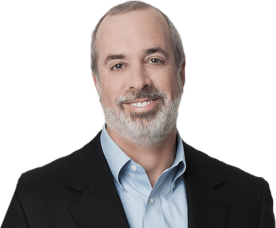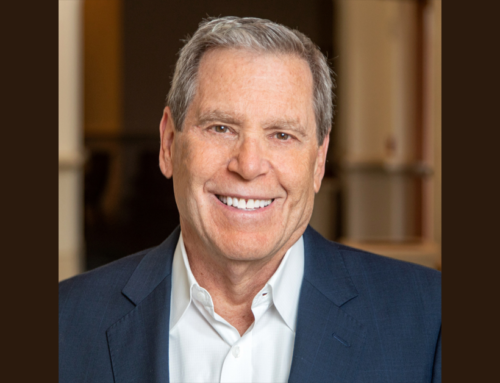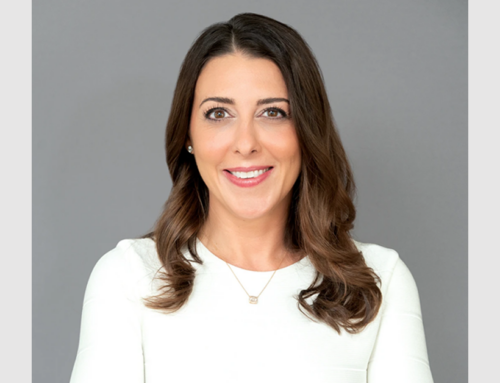
Ric Edelman: You’re going to have to do for 1,000 people what you currently do for 100. It’s all going to be about scalability and replicability while maintaining consistency for the client experience.
Ric Edelman is one of those rare people who can make bold, provocative statements AND have the experience and track record to prove that he’s not just blowing smoke.
If you ask industry people who has been the most successful financial advisor over the past 30 years, Ric Edelman would likely top the list. Starting from scratch in the 1980’s, Ric built a juggernaut with 30,000 clients, 125 financial advisors, 500 employees in 42 offices, and $15 billion in AUM.
When I asked Ric what the next 10 years looks like, he said, “10X. Add a zero to everything.” He talks about this concept of exponential growth and how that impacts the way you should be planning for clients in his new book, “The Truth About Your Future: The Money Guide You Need Now, Later, and Much Later.”
What’s even more impressive than the raw numbers Ric has generated to date is how he did it–through organic growth.
Ric leveraged his journalism background and became a massive media star spanning multiple bestselling books, a nationally syndicated radio show, and a popular television show. Through educating the public, Ric Edelman gained trust and the clients followed by the thousands.
To continue reading the rest of this post, please register below with your email address.
Exponential Technology
A few years ago, Ric got deeply engaged with the idea of exponential technology. Popularized by the folks at Singularity University, exponential technologies are behind some of the fastest growing companies in the world such as Uber, Airbnb, Betterment, Facebook, Google, and many others. By 2012, Ric had graduated from Singularity University and went on to become a guest lecturer and investor in the University.
Ric approached exponential technology from a financial planner’s perspective. He wanted to figure out two things. First, how do we need to change the advice that we give to our clients as a result of the introduction of these technologies into the world? And second, how do we need to change the way we deliver that advice?
The Advice We Give Will Change
As one simple example, exponential technology will enable humans to live much longer and healthier lives. Biomedical gerontologist Dr. Aubrey De Grey says the first person to live to 150 has already been born. Imagine the planning implications of living to 150?
- The notion of retiring at 65 and dying at 85 is gone.
- Life insurance will get cheaper and long-term care insurance may completely go away.
- The nature of long-term relationships may change dramatically as people contemplate being married for more than 100 years.
- Career planning will take on new urgency as people will likely cycle through many careers throughout their lifetime.
- The traditional linear lifecycle of you’re born, go to school, get a job, work for 40 years, retire, then die, may turn into a cyclical lifestyle where the pieces get all mixed up and repeated several times throughout your lifetime.
- Housing arrangements may change significantly in later years as multiple generations of families are alive at the same time.
Ric said they haven’t officially rolled out their new planning advice based on the society changes they see coming, but they have laid out a four-step plan to make it happen.
First, he said, “We have to conclude exactly what changes we think are coming, the implications of those changes, how soon they’re going to change, and what should the advice be that we are actually giving.” The firm is in the early stages of that work now. Saving for college will likely be the first area where they adjust their planning advice because, “It is one of the most urgent areas of impact for our current clients.”
Second, they’ll focus on what to do with long-term care recommendations.
Third, they’ll tackle the idea of life-long learning and the importance of continuing to learn as your careers change over an expanded lifetime.
Fourth, they’ll research how living arrangements in your senior years may change and what that means from a financial planning standpoint.
Ric said they’ve been testing some of these new ideas to see what kind of feedback they’ll get from clients. “We have done a couple of seminars for some groups of clients to introduce this and to see what their reactions are. The reactions are generally very favorable. People are excited at what’s coming, but there is also some element of fear partly because of certain unknowns. For example, there’s a lot of concern over artificial intelligence and whether machines could become the Terminator.”
The Way Advice is Delivered Will Change
“Mobile.” In a word, that’s how advice will be delivered in the future, according to Ric.
“We are moving to mobile technology very, very rapidly. I don’t know if we’re going to need to maintain brick and mortar facilities for a whole lot longer because of mobile technology.”
The traditional in-person planning meeting will become the exception, not the rule. “You’ll do planning on the fly with your clients via Skype or FaceTime or whatever the next technology will be,” he said.
And it gets even more interesting. “From mobile technology, we’re going to go to holographic technology using virtual reality and augmented reality technologies. You’ll be able to be anywhere in the world and virtually be with your client at the same time. It’ll make life easier and more convenient. Costs will drop and results will get better. It will lead to stronger, more improved relationships. On the downside, it means everybody will be working 24/7.”
 Robo Advisors Are Not a Threat to Financial Advisors
Robo Advisors Are Not a Threat to Financial Advisors
Ric was an early mover in the robo advisor area when he launched Edelman Online a few years ago. Unlike Betterment and Wealthfront who charged extremely low fees, Edelman Online charged the same fee as clients who used their live planners. And Edelman Financial allowed clients to seamlessly move in both directions between the online model and live planners. “It is completely interchangeable. We don’t care which way they do it because the fee schedule’s the same,” he said.
With a few years of robo advisor experience under his belt, Ric has learned a few things.
First, online investing is not just for young people. The average age of a new client coming to Edelman is 57 while the average age of their online clients is 54. Only a three-year spread. The desire to use an online service isn’t a function of age, rather, “It’s a function of lifestyle and preference,” said Ric.
Second, their online service has not been growing—but not for the reason you may think. Total assets in the service have been relatively stable but what’s happening is, “About half of the people who start out with our online service migrate over to our brick and mortar side.” Clients realize that investing is just one piece and often times they need help with all the other things advisors do, so they migrate to using the full service offering.
Interestingly, Schwab discovered that robo advisor clients like to talk to planners, too. In a little noticed comment from a Bloomberg article, Tobin McDaniel, president of Schwab Wealth Investment Advisory, said Schwab Intelligent Portfolios now makes available a small team of professionals who can give financial planning advice. The article said, “finding that a lot of their clients value the human element was,” to quote McDaniel, “a little surprise for us.” McDaniel said online investors, “Trust the system but like to know that someone is verifying the information.”
Of course, Vanguard knows this, too. There’s tremendous power when you combine online technology with human access.
The third thing Ric learned from their online experience is they are not a threat to financial advisors. “It’s for one simple reason. The online services are simply today’s version of Vanguard. They are simply a product that appeals to the do-it-yourself investor, the no load client who would never pay 1% a year for advice. The person who’s a hobbyist who likes to do it himself. They would never hire us anyway.”
Here’s what Jon Stein, founder of Betterment, had to say about the growth prospects of his firm when I interviewed him for an earlier podcast.
You Need a Killer Brand
Another reason why Vanguard is “kicking butt” is because they have an incredible brand. As technology makes things cheaper and cheaper, it’s harder for advisors to differentiate themselves based on the products or services they offer. So what will make one advisor different than another?
“It’s going to be your brand. It’s going to be your market presence. It’s going to be the reputation. It’s going to be the confidence level the consumers who are looking for you have about you as opposed to the other,” said Ric.
And it’s not about low price. “People recognize that there’s more to life than low price. When you pay a low price, you’re going to get a low frills service. People who value relationship, who value more than just the price are going to be willing to pay for it. The brand is going to drive that.”
This is one reason why the mega-firms like United Capital, Creative Planning, and HighTower are very focused on creating a national brand. It will help prevent a race to the bottom with pricing and make clients feel assured that they will get a consistent experience from a brand they know. See my conversation with Joe Duran of United Capital here, my convo with Peter Mallouk of Creative Planning here, and my convo with Elliot Weissbluth of HighTower here.
Ric Edelman Says Don’t Do Anything Just Once
In order to compete effectively in the future, you’ll have to pick a business model. For example, you could be all things to a select group of clients who are willing to pay top dollar for concierge-level services. However, that’s not a scalable model. Or, you could try to grow beyond a niche practice and reach a large number of people.
The key, said Ric is, “It’s all about scalability and consistency. You have to adopt a Starbucks methodology. Look at what you do in your practice. Can you do it 1,000 times? If you can’t, you’re wasting your time.”
“What it all really means is you’re going to have to do for 1,000 people what you currently do for 100 of them. If you have 100, you’re going to have to do for the 100 what you have generally done for only one. It’s all going to be about scalability and replicability while maintaining consistency for the client experience,” he said.
At Ric’s firm, each advisor routinely works with 400 to 500 clients. And he says, “We’re able to provide each one of those clients a far better experience than they typically get from any other firm. Why? My advisors only do one thing. They advise. They aren’t spending any of their time on marketing. They’re not spending any of their time on operations or paperwork or trading or compliance or HR or IT. They’re not looking for office leases. They’re not doing any of the distracting things that punishes so many advisors.”
What if you’re working with 150 clients and feeling maxed out? “Planners who feel that they’re maxed out with their 150 clients are doing it wrong. They’re doing it in a way that isn’t sustainable. They’re either going to have to change the way they’re operating their practice or turn their practice over to someone who can do it for them,” said Ric.
Growth Through Acquisition
The financial advisory industry is still in the very early stages of maturation and Ric expects to eventually see, “A relatively small number of super sized organizations just like you see in the airline industry, just like you see in the tech industry, just like you see everywhere except in our business.”
Edelman Financial has historically grown organically but Ric now says, “It is pretty clear to us that we will be doing acquisitions of other advisory practices, including very small ones such as 20 million to 50 million AUM firms. We have a capability of absorbing them into our practice, making them more successful than ever with a better lifestyle for the principle, all wrapped in a package that they aren’t able to obtain on their own. I think we’re going to see a lot of M&A activity.” So acquisitions will be one way Edelman Financial reaches 10x over the next few years.
I’ve asked several leaders on my podcast how they see the industry evolving. I think there’s a consensus forming that the big will get much bigger, the middle will get squeezed (they have the costs of the larger firms without the nimbleness of smaller firms) and the small firms will niche.
This is an exact issue I’m working on with several of my coaching clients. They’re in that middle tier and we’re working on getting them to that next level where efficiencies and scale really kick in. Learn more about my coaching services here.
Build It or Join It
It’s clear, our industry is changing rapidly—and at an accelerating pace. And there’s no doubt the firm of the future will look much different than today. If you plan on being in this business for at least five more years, you should be aggressively working on a plan to ensure your firm is one who will thrive.
Ric framed it very succinctly when he said, “You’re either going to build a firm of the future or you’re going to join one.”
It’s time to choose.
I invite you to join me on this journey as Belay Advisor continues to push boundaries and bring the most Actionable Intelligence to you.









